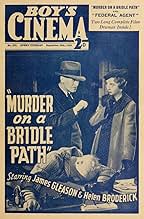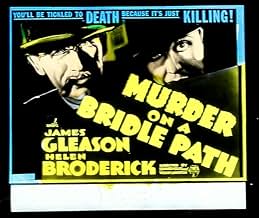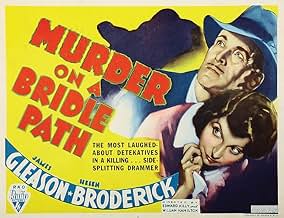Una joven es encontrada muerta en Central Park. La primera impresión es que se trata de un accidente, pero la profesora Withers no está tan segura de eso, por suerte para su compañero de ave... Leer todoUna joven es encontrada muerta en Central Park. La primera impresión es que se trata de un accidente, pero la profesora Withers no está tan segura de eso, por suerte para su compañero de aventuras el inspector Piper.Una joven es encontrada muerta en Central Park. La primera impresión es que se trata de un accidente, pero la profesora Withers no está tan segura de eso, por suerte para su compañero de aventuras el inspector Piper.
- Dirección
- Guionistas
- Elenco
- Taxi Driver
- (sin créditos)
- Pipe Expert
- (sin créditos)
Opiniones destacadas
The film starts with a blonde lady being disagreeable with several folks--a clear giveaway that she'll soon be murdered (it's a standard cliché in mystery films of the time). VERY soon after, she's killed while out riding her horse. Again, Calvinnme was right--this character wasn't developed enough and her death came too quickly. The police assume she died by accident but soon they notice a few clues that indicate she was NOT killed by being kicked by a horse. Around this time, Hildegarde shows up and immediately begins digging for clues. Like any murder mystery of the era, there are lots of dead ends and twists--along with a VERY florid ending involving the murderer--and it's by far the best part of the movie.
This is a pretty good mystery film. Unfortunately, the snappy dialog from Withers isn't as obvious--not just due to Broderick but because the writing is a bit less snappy. Enjoyable but that's really about all.
Helen Broderick gives Hildegard a very different slant than did Edna May Oliver - she's more energetic and even more sharp tongued with plenty of great one liners, but I miss Oliver whose arched expressions of dismay at the police stupidity; I loved her voice, too. But Broderick does her best and comes across being on the ball. It's a good mystery, plenty to be puzzled over till the case is solved.
This is, indeed, the fourth murder case on which Miss Withers assists, critiques, leads, follows, and just generally offers suggestions to her crusty detective friend. James Gleason's Oscar Piper is once again easily chagrined but grudgingly respectful of Miss Withers' detecting skills; Helen Broderick takes on the role of school teacher and amateur sleuth Hildegarde Withers for the first and only time. This Withers is a bit less tart and somewhat more conscious of her own wittiness than the earlier Withers (as portrayed by Edna May Oliver). Broderick and Gleason quickly establish a rapport and relationship that—as in the earlier films in the series—is easily our primary reason for watching.
The plot involves the death of society girl Violet Feveral, played (albeit briefly) with delicious nastiness by Sheila Terry. Suspects abound—this Violet was, in the best whodunit tradition, wildly unpopular and had handed out insults and injuries to numerous other characters in the hours and days before her death. The familiar faces in the lineup of suspects include Louise Latimer as a sister to the victim; John Carroll as a family employee; and Leslie Fenton, who is quite good as the nervous ex-husband who has just been mysteriously released from jail. Willie Best stands out in his usual thankless role as a stable boy who may have a clue or two; his deadpan delivery when answering questions (What was he doing in jail? "Shooting craps." No, what was he in jail for? "Shooting craps.") squeezes the maximum out of a role that's otherwise a lame stereotype.
The mystery itself is not particularly inventive or suspenseful; however, the story moves along briskly and the actors and script are competent if not brilliant. The interaction between Gleason and Broderick is clearly presented as the center of the picture—and that relationship between a couple of pros is a lot of fun to watch. (One example: Oscar suggests that the murder was a "crime of passion," to which Hildegarde snaps, "Oscar, don't you think we'd better try to keep this case clean?")
Bonus: we are instructed what can be learned about a person from examining his pipe!
I do agree with the last reviewer that if you had NOT seen the earlier films starring Oliver, you would have apprecaited this entry even more. It's not all that bad, and even a tad creepy in spots, however Broderick's portrayal of the clever female detective is not the same as Olivers. While the latter employed wise-cracks and priceless frowns, Helen Broderick appears more calculating, seemingly taking mental notes of suspects, and strangely appears to have less dialogue. At times she is over-shadowed by detective James Gleason, who supplies all the one liners. Broderick, a very good actress in her own right, looks the part, but you are definitely thinking Edna May Oliver.
Still, it's an interesting late night mystery, all about an unpopular socialite who takes a horse ride --and never comes back. It will definitely keep you guessing (many suspects at large), and the suspenseful ending was exceptionally written. This is perhaps Broderick's best scene. Also, the supporting cast is very good. Comedian Zasu Pitts took over the lead in the next entry. This is in a super dvd box set of Hildegard Withers mysteries, not to be missed.
The idea to replace the perfect Withers, the arch and tightly corseted Edna May Oliver with the sophisticated, spiritually if not literally uncorseted Broderick would seem to have been grounded in the wonderful wise cracking relationship Withers had with James Gleason's much put-upon Inspector Oscar Piper, and to that extent it works.
Broderick, the beloved sophisticate of the Fred Astaire films TOP HAT and SWING TIME, gets off some good ones ("Oh, I have some influence with Inspector Piper; we used to room together in college!"), but it's hard to picture her as the prim school teacher that Palmer's Miss Withers says she is.
The film has the further drawback for some modern audiences in incorporating some of the racist stereotypes of the era in Willie "High Pockets" Best's excellent performance as the slow but steadfast stable boy who may be near the center of the mystery. In 42 films from 1934 to 1947 (just to consider the ones reviewed in the New York Times - some, like HIGH SIERRA and CABIN IN THE SKY, genuine classics), Best took the work Hollywood offered and made his characters shine - whatever limitations Hollywood may have placed on the casting of black actors.
MURDER ON A BRIDLE PATH has a good cast all around (among the series regulars, James Gleason's Piper, James Donlan's comic detective and Gustav Von Seyffertitz's police doctor are some of their best performances), and boasts an excellent mystery at the core. The OBSERVANT viewer even has an honest chance to beat Withers and Piper to the solution despite some delicious red herrings along the way.
Radio Pictures had clearly moved the series to a back burner when Oliver left (no more "name" producers and even Max Steiner's musical contributions went uncredited this time), but at least with Broderick finding the clues and lending a major hand with the comedy, the quality stayed high.
Later in the year, the studio would turn to Zasu Pitts for two final "Miss Withers" films, and while she would return the unsophisticated primness to the character and (in small doses) Pitt could be a brilliant diffident comedienne, the quality of the writing and the chemistry between Hildegarde and Oscar never regained the level it had maintained with Edna May Oliver and Helen Broderick.
It's a pity, because the franchise was one of the more enjoyable creations of the 30's when the "cozy" mystery was at its peak and every studio seemed to be trying their hand at popularizing distinctive detectives from Philo Vance and Nick & Nora Charles to Charlie Chan and Mr. Moto. Miss Withers is missed.
¿Sabías que…?
- TriviaAlthough this is the first and only time Helen Broderick played Hildegarde Withers in the six picture series, James Gleason played Inspector Oscar Piper in all of them.
- ErroresWhen Hildegard is looking through the telescope, the field of view follows the horse running around the track, yet she doesn't move the telescope.
- Citas
Hildegarde Withers: How long have you worked around here?
'High-Pockets': About three months, Ma'am... not countin' the week I was in jail.
Hildegarde Withers: What were you doing in jail?
'High-Pockets': Shootin' craps.
Hildegarde Withers: No, I mean what did they put you in jail for?
'High-Pockets': Shootin' craps.
- ConexionesFollowed by The Plot Thickens (1936)
Selecciones populares
Detalles
- Fecha de lanzamiento
- País de origen
- Idioma
- También se conoce como
- The Puzzle of the Briar Pipe
- Locaciones de filmación
- Productora
- Ver más créditos de la compañía en IMDbPro
- Tiempo de ejecución
- 1h 6min(66 min)
- Color
- Relación de aspecto
- 1.37 : 1
































